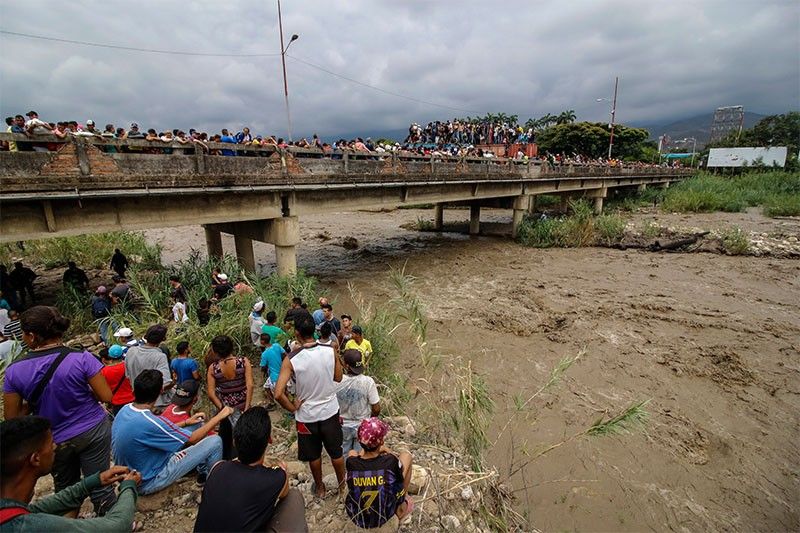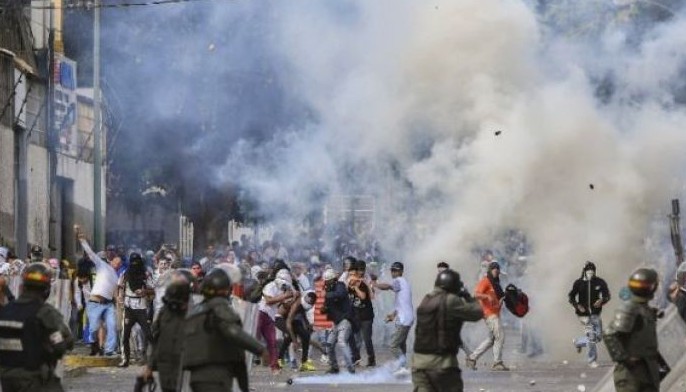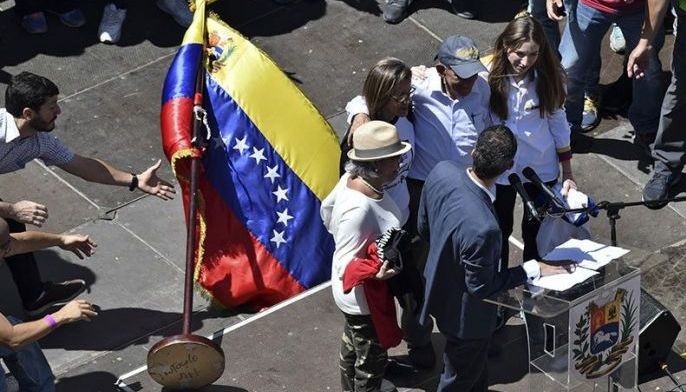Rich and poor united in desperate quest for water in Venezuela

CARACAS, Venezuela — Crippling power blackouts are subjecting Venezuelans to a second phase of deprivation -- massive water shortages that make no distinction in income or social class, forcing rich and poor alike to wait in long lines for drinking water, while some hoist it from sewers to be able to flush their toilets.
On the hill in the Caracas neighborhood of Petare -- the country's largest slum home to more than half a million people -- hundreds of people line up day and night behind two wells.
They carry anything that can hold water -- drums, cans, bottles, buckets. When their turn comes, they take as much as they can.
The water is not drinkable, but it will allow them some dignity, to bathe or wash clothes.
For the past month, repeated massive blackouts have plunged the country into darkness and disarray. As a result, electric water pumps have shut down, forcing a cut in water supplies.
'No water'
"We have no water, no electricity, the power cuts are terrible. Food is going bad," says 78-year-old Ernestine Velasco as she recites a litany of deprivation in her modest house, located on an unpaved street in the March 24 district.
"We are having a bad time. There is no transport, there's nothing."
Lack of water is a chronic problem in this teeming corner of Caracas. Though the cost is minimal, the service is non-existent, Velasco says.
"Thank God, we have this," she adds, pointing to the two wells nearby, though "it's chaos, it makes you want to run away."
Locals are waiting for the state water company to restore supplies. Even then, they expect it will only be for a few hours.
"We are dry. We don't have a single drop," said Carmen Moncada, tipping over an empty drum.
A little further on, in the district of El Valle, a crowd formed around a manhole, drawing up water for their toilets.
President Nicolas Maduro has ordered electricity rationing for the next month in a bid to buy his engineers time to fix the problem, which he blames on opposition sabotage designed "to drive the country crazy."
The working day has officially been shortened to ease the strain on the grid and allow people to get home before dark. Schools that have been shut since March 26 are expected to reopen on Wednesday, however.
Prohibitive price
In a Caracas park where a water tanker is dispensing supplies, a lawyer from the upscale northern neighborhood of La Castellana arrives to buy the whole tanker-full for his apartment building.
The driver of the 1969-era truck, which holds 2,100 gallons (8,000 liters) is quick to name his price: "For La Castellana, it's $200."
Despite the prohibitive price -- Venezuela's minimum wage is just over $5 -- the lawyer doesn't argue.
"This is the price we have to pay to stay in Venezuela," said the 42-year-old lawyer, who declined to give his name.
He said he would have to collect the money from his remaining neighbors, a third of whom have joined the exodus of 2.7 million Venezuelans the United Nations say have have left the country since the economic crisis began in 2015.
One possible solution for the lawyer and his neighbors was to sink a well to tap the aquifer at nearby El Avila hill, but that would cost $20,000. Right now, the cheaper solution is the tanker.
Every day, people fill up from streams running from the hill.
William the driver gets his water at a spring in the city's Eastern Park -- with government approval -- forming a line with other tanker drivers.
In return, they must make three free trips on the government's behalf to distribute water in various parts of the capital. The army enforces the agreement.
But in poor areas like March 24, the trucks are slow to arrive, playing on the nerves of locals like Carmen Veliz. She says that in other areas nearby, there has been no water "for months."
Such exasperation drove hundreds of people onto the streets Sunday to beat pots and pans in a display of outrage in different parts of the capital.
At least three people were injured in clashes with police and pro-government armed "colectivos" sent to tamp down the protests.
"What is the government doing? Neither one thing nor the other," says one woman.
Referring equally to Maduro's rival Guaido, she adds: "No one comes to help us...they are all useless."
Venezuelan President Nicolas Maduro accuses Colombia of being behind an "attack" with an explosive-laden drone he said targeted him on Saturday (Sunday, Manila time).
Speaking shortly after state television showed him cut off mid-speech in front of a Caracas military parade by a bang, Maduro says a "flying object exploded in front of me" and blamed the incident on Colombia's President Juan Manuel Santos.
"It was an attack to kill me, they tried to assassinate me today," Maduro says in a state broadcast. "I have no doubt that the name Juan Manuel Santos is behind this attack." — AFP
The government of Nicolas Maduro and the Venezuelan opposition broke a political stalemate Saturday with a broad social accord, and the US government responded by allowing a major US oil company to resume operations in Venezuela.
The accord heralded a potential easing of a grinding economic and political crisis in Venezuela.
It paves the way for the United Nations to oversee a trust fund of frozen assets of the Maduro government to be used for a variety of social projects in the South American country, including programs related to education, health, food security, flood response and electricity.
"We have identified a set of resources belonging to the Venezuelan state, frozen in the global financial system, to which it is possible to access," said Dag Nylander, an envoy from Norway, which facilitated the negotiations. The amount to be released was not specified.
The agreement, signed in Mexico, ended 15 months of stalemate between the two sides, potentially easing a massive flow of refugees from Venezuela throughout the region and even impacting world oil markets.
Maduro praised the deal on Twitter, saying it "opens the way for a new chapter for Venezuela, to keep advancing towards the peace and well-being that all Venezuelans yearn for." — AFP
A US delegation arrived in Venezuela Monday to discuss a "bilateral agenda," extending discussions between Caracas and Washington initiated in March, said Venezuelan President Nicolas Maduro.
National Assembly speaker, Jorge Rodriguez, "is receiving a delegation from the government of the United States, an important delegation that arrived two hours ago in Venezuela," Maduro announced on national public television VTV at around 8:00 pm (0000 GMT).
Rodriguez is also the Venezuelan government's negotiator in talks with the opposition, which have been at a standstill since last October.
Washington had sent a high-level delegation to Caracas in early March, a few days after Russia invaded Ukraine. Several observers said the move was aimed at trying to distance Caracas from one of its main allies, Moscow, and discussing an easing of US sanctions on Venezuelan oil after the invasion caused a spike in global fuel prices.
The White House confirmed the meeting but only said the discussions had focused in particular on American "energy security." Before its rupture with Washington, Venezuela exported almost all of its oil production to the United States.
After those discussions, Caracas released two Americans detained in Venezuela in what was widely seen as a goodwill gesture.
In May, Washington announced it would ease some limited sanctions against Venezuela, including one linked to the oil company Chevron, to promote dialogue between Maduro's government and the opposition. -- AFP
The International Criminal Court has opened an office in Venezuela as part of an investigation into alleged human rights abuses during anti-government protests in 2017, authorities announced on Thursday.
The ICC opened a formal investigation into the alleged rights violations last November and signed a memorandum of understanding with Venezuelan President Nicolas Maduro which stated that the South American country would take "measures" to ensure the court would be able to work.
"It's a very important step, very significant. This is not for appearance's sake, it is something concrete that will allow me to carry out my responsibilities," said ICC prosecutor Karim Khan alongside Maduro at the presidential palace in Caracas.
"Venezuela will now have this office that will provide us with an effective level of dialogue in real time that is more efficient," said Maduro, who has been in power since 2013. — AFP
President Nicolas Maduro says that EU monitors of Venezuelan local elections were "enemies" and "spies," denying their assertion that last week's voting was marred by irregularities.
"Those who came as enemies, the delegation of spies from the European Union, found not a bit of evidence to criticize the electoral system," Maduro says of the November 21 vote for gubernatorial and mayoral posts.
Candidates that back the Maduro government were declared the winners in the vast majority of the races. — AFP
Venezuela's opposition calls on President Nicolas Maduro's government to resume talks to resolve their differences, after the ruling party withdrew from the latest round that was to begin Sunday in Mexico.
"We urge the other side to resume the sessions in Mexico as soon as possible to produce the necessary agreements," Gerardo Blyde, head of the opposition team, says at a press conference in Mexico City.
The meeting was to run until Wednesday. — AFP
- Latest
- Trending


































